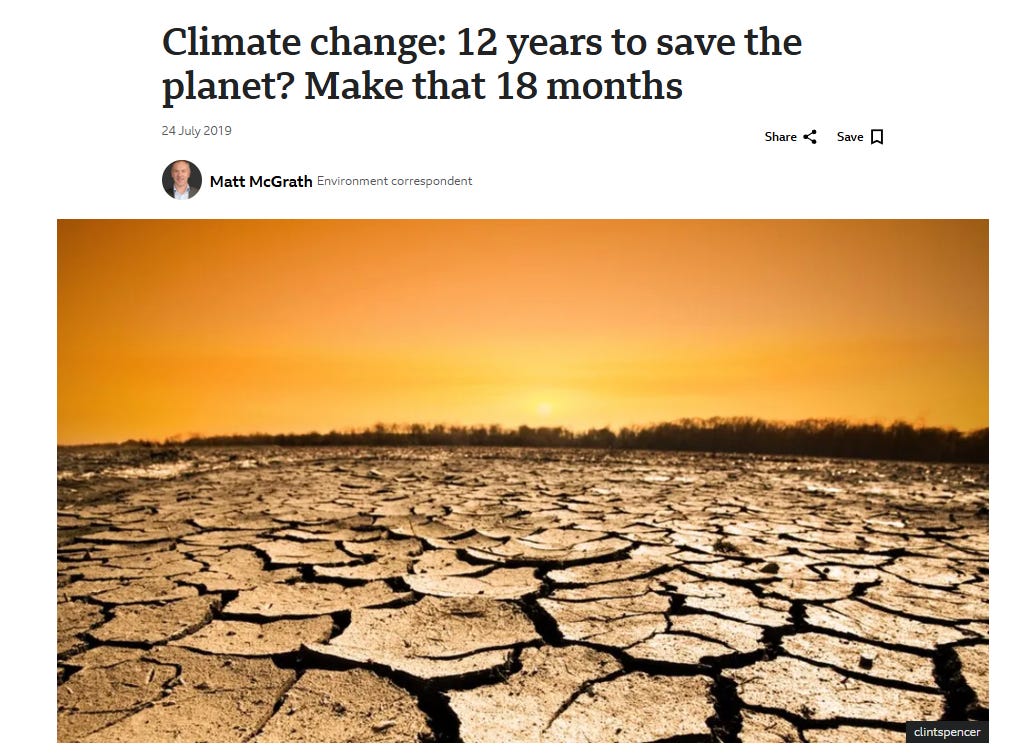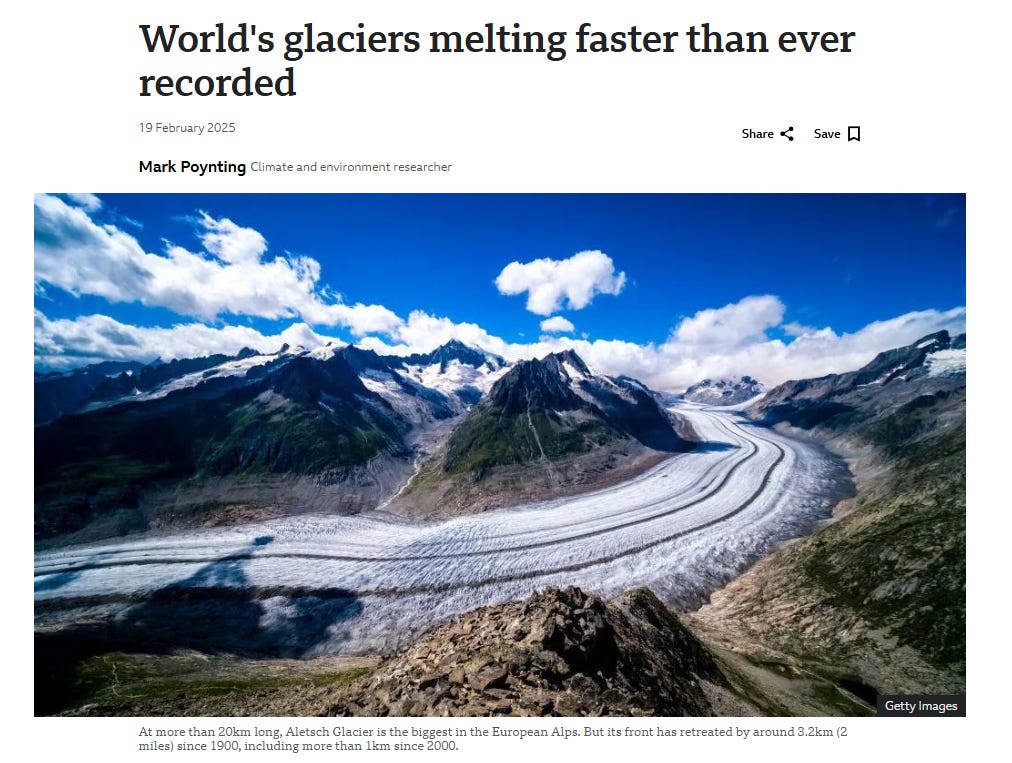Yes, Environmentalism Has a Big PR Problem
Here's Why Viral Climate Content Makes People Less Likely to Act
This is the first in a series where I'll be diving into the wild world of environmentalism and sustainability from the perspective of someone who's still pretty new to all this.
I'm trying to make sense of why some approaches work and others completely backfire, and I want to share what I'm learning about the psychology behind getting people actually excited about this stuff instead of getting defensive or guilty.
Before I start, let me ask you something:
What's the first thing that pops into your head when someone mentions environmentalism?
If you're just a normal person scrolling through your feed, not actively seeking out environmental stuff, it's probably not sunshine and rainbows. Maybe it's those headlines that made your stomach drop a little.
You know the ones. Here are some prominent example:
Look familiar?
I remember scrolling through my feed one morning and seeing three different articles about environmental disasters before I'd even finished my coffee. By the time I got to work, I felt like the world was ending and it was somehow my fault for using a disposable cup.
Here's the thing I've noticed: environmental messaging has this weird obsession with scaring the living daylights out of people.
And I get it.
Climate change IS scary, pollution IS a real problem, and we DO need to act. But somewhere along the way, we got stuck in this cycle where the only way to talk about the environment is through pure, concentrated dread.
So How Does That Make You Feel?
Be honest with me here.
When you see those apocalyptic headlines, do you feel energized and ready to plant trees and change the world? Or do you feel more like... pulling the covers over your head and pretending none of it exists?
If you picked option two, you're definitely not alone. I spent months feeling like the world was ending and there was absolutely nothing I could do about it. I'd read an article about rising sea levels and then stare at my reusable water bottle thinking, "What's the point? This tiny thing isn't going to save polar bears."
Turns out, there's actually research on this.
Scientists call it "eco-paralysis". Basically, when people feel overwhelmed by how massive these problems are, they just... shut down. It's like when your computer freezes because too many programs are running at once, except the program that's frozen is your motivation to do anything helpful.
The research is pretty eye-opening.
A team of Penn State researchers found that people who were bombarded with fear-based environmental messages were way more likely to just avoid the topic entirely or convince themselves it wasn't real.
Another 2024 study showed that high-fear messaging actually triggered what psychologists call "defensive behaviors." Essentially, our brains protect us from overwhelming information by either denying it or just tuning it out completely.
Think about it: when was the last time you saw a scary climate headline and thought, "You know what? I'm inspired to completely change my lifestyle right now!"
Probably never, right?
More likely, you felt that familiar knot in your stomach and maybe switched to looking at cat videos instead.
The Weird Thing About Doom Content
Here's where it gets really interesting (and a little depressing): those scary articles? They're incredibly good at one thing. Getting shared.
Researchers looked at 59,000 people across 63 countries and found that messages like "Climate change poses a serious threat to humanity" spread like wildfire on social media. People see them, get that jolt of "oh no, everyone needs to know about this," and hit share faster than you can say "carbon footprint."
I totally get this impulse. I've done it myself. Seen some terrifying statistic about plastic in the ocean and immediately shared it because it felt urgent and important. It feels like you're doing something, like you're part of the solution just by spreading awareness.
But here's the kicker.
All that sharing doesn't actually translate to people doing anything in real life. It's like when you share a post about a missing dog and feel like you've helped, even though you didn't actually go out looking. Psychologists call this "moral licensing." Basically, your brain tricks you into thinking you've done your good deed for the day.
The study found that people were way more likely to share intimidating climate messages online, but when researchers followed up to see if those same people had actually taken any real-world actions like planting trees or reducing their energy use, the numbers dropped dramatically. The sharing gave people a sense of accomplishment that actually reduced their motivation to do more tangible things.
Meanwhile, the constant stream of "the world is ending" news creates what experts are calling "eco-anxiety."
It's this chronic, low-level panic about environmental doom that just sits in the back of your mind. I've talked to friends who say they feel guilty every time they throw something away, or who lie awake at night worrying about what kind of world they're leaving for their kids.
And when people feel like the problem is impossibly huge and their individual actions are microscopic in comparison, they often end up doing... nothing. It's a psychological phenomenon where feeling powerless leads to actual powerlessness.
Why bother recycling when you read that 100 companies are responsible for 71% of emissions?
Why try to reduce your plastic use when you see images of garbage patches the size of Texas floating in the ocean?
Research from Penn State found that while scary environmental news definitely increases fear (no surprise there), it also makes people feel more helpless and less capable of making a difference. It's like telling someone their house is on fire but not showing them where the fire extinguisher is – or worse, convincing them that the fire extinguisher they have is basically useless.
I see this pattern everywhere now.
People who care deeply about the environment but feel so overwhelmed they've basically given up trying. Or people who used to be engaged but burned out from the constant emotional weight of it all. There's even a term for people who avoid environmental news entirely because it makes them too anxious: "solution aversion."
The Death Cycle Of Doom & Gloom Messages
So here we are, stuck in this weird place where the most attention-grabbing environmental content is also the least effective at getting people to actually care long-term or take action.
We've accidentally created this feedback loop where the scariest stories get the most clicks, which encourages more scary stories, which makes people more overwhelmed and less likely to engage meaningfully.
Don't get me wrong. I think the people creating this content genuinely want to help and raise awareness. Environmental journalists and activists are seeing real, urgent problems and trying to communicate that urgency. The intention is absolutely good. But somewhere along the way, we've accidentally made environmentalism feel like this heavy, guilt-inducing burden that most people just want to avoid.
I think about my own journey with this stuff, and how many times I almost gave up entirely because it felt too big, too scary, too hopeless. And I'm someone who actively chose to care about this topic! I can only imagine how it feels for people who are just casually interested or who stumble across these articles in their news feed.
And honestly? That breaks my heart a little.
Because caring about our planet should feel hopeful and empowering, not like carrying around a constant weight of impending doom. It should feel like being part of something bigger than yourself, not like being personally responsible for preventing the apocalypse.
If we really want to create a world where more people are excited to be part of environmental solutions, we need to completely rethink how we talk about this stuff. We need to show people that being environmentally conscious can actually make their lives better, not just prevent them from getting worse.
The good news?
I've been diving deep into the psychology behind what actually motivates people to act, and there are some pretty amazing strategies out there that we're barely using.
I'm putting together everything I've learned about this next week. I think we can do so much better. Subscribe to receive notifications when my next article is out. I post weekly, with absolutely no spams.
A quick note:
This whole series exists because of Lauren Sproule's brilliant article that first helped me reflected on this problem, and Robin F. Pool , whose thoughtful comments helped me see just how deep this goes.
If you found this useful, please share it.
Every time someone shares a hopeful, solution-focused piece about environmentalism instead of another "we're all doomed" article, we're actually changing the conversation. We're showing people that caring about the planet doesn't have to feel like carrying the weight of the world. Your share is literally fighting back against all those fear-based articles that make people want to give up.
So please, hit that share button. Let's make environmentalism feel inspiring again.




Journalism and PR are distinctly different disciplines, as they should be. It’s crucial that journalists report the truth on climate collapse. But I take your point that the truth may paralyze some people, but not all. However I think we’re past the point of making the truth more palatable. The Brazilian quote that you can’t swim until the water reaches your bum — I feel is a very apt analogy for where we are with regards to the actions of every day people.
This is an interesting article. I used to read such content too. Eventually I wasn't learning anything new and always felt like I wasn't doing anything with the information. It's a negative feedback and too separate from the physical environment that I cared so much about. It's easy to think at macro scale and want to affect change at that level. But it's very hard and can lead to paralysis. Recently I started to volunteer in my local community at the salmon hatchery and started feeling much better. I'm in touch with the physical world, meet some great people and see results of our work. I would encourage others to get involved with your local community too. Maybe, just maybe by having lots of people involved at this level we can help change the macro level in time.